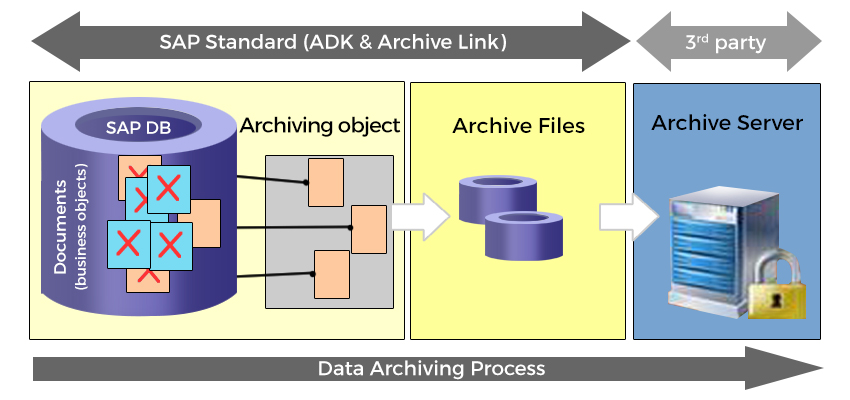Reduce the volume of your transaction data and significantly, reduce costs and significantly improve performance with archiving.
SAP DATA ARCHIVING
SAP Data Archiving is the process of moving infrequently accessed historical data from closed business transactions, from high cost Database storage to low cost Archive storage, retaining real-time access from SAP screens. The data archiving tools are in-built into SAP applications and they also work with 3rd party external archive applications for storing these archives.
SAP DATA ARCHIVING - CHALLENGES & OPPORTUNITIES
Explosive data growth in SAP systems causes deterioration of application performance and user productivity, high costs due to large tier-1 Enterprise Storage volumes with redundancy as well as high administration costs due to long backup and maintenance windows. Furthermore, large databases cause longer system downtimes during upgrades and restorations, resulting in loss of business.
Simply deleting this data is often not a valid option, due to legal data retention requirements. The best and most viable solution is Data Archiving.
SAP DATA ARCHIVING SOLUTIONS ADDRESSING BUSINESS NEEDS
Avaali follows global best practices for SAP Data Archiving implementations, based on many years of implementation experience. We recommend and work with you in the following ways:
Start Early
- System Age – typically for systems that have been live for 2 to 4 Years
- DB Size – typically 750 GB or more
- Growth rate – typically 15+% or more annually
Identify the right data for archiving
- Space savings achievable
- Business impact and dependencies
- Application performance
- What not to archive
Consider holistic SAP Data Management
Apart from archiving, some data may need to be deactivated or purged (as they are not required for business or for audit) or may be subject summarization techniques.
Target quick wins
Choosing data which are fast growing but have low criticality and dependencies or those which are purely technical, yields quicker space savings. This also ensures that business buy-in and acceptance is won before moving on to more complex data.
Conduct In-depth Data Analysis
It should be done to achieve maximum benefits from archiving, to minimise risks and to ensure business buy-in and acceptance of the archiving solution. For example, open business documents need to be closed before they can be archived. An analysis will show what data is still open, following which Avaali consultants will make recommendations on how to close data and make it ready for archiving. Furthermore, it is important to investigate the business impact of archiving to know where the data is being used and how users would need to access data from the archives.
Work closely with business and legal teams
They can put in place appropriate residence rules (how long the data must remain in the before archiving) and retention rules (total time the data must available before it can be disposed/shred/deleted) for different types of data.
Put in place archive access mechanisms
This will enable minimal or no impact for business users when they access data in reports and transactions. Avaali consultants will ensure seamless real-time retrieval of archived data.
The Avaali Advantages
Avaali follows global best practices for SAP Data Archiving implementations, based on many years of implementation experience. We analyse your SAP application databases, your data growth areas, pain points and regulatory requirements, and work with you to put in place an SAP Data Management strategy based on recommended best practices. We are also partners with 3rd party archive application vendors such as OpenText and can support you in implementing these applications and connecting them to SAP applications to store the data archive files in a secure and compliant manner.

